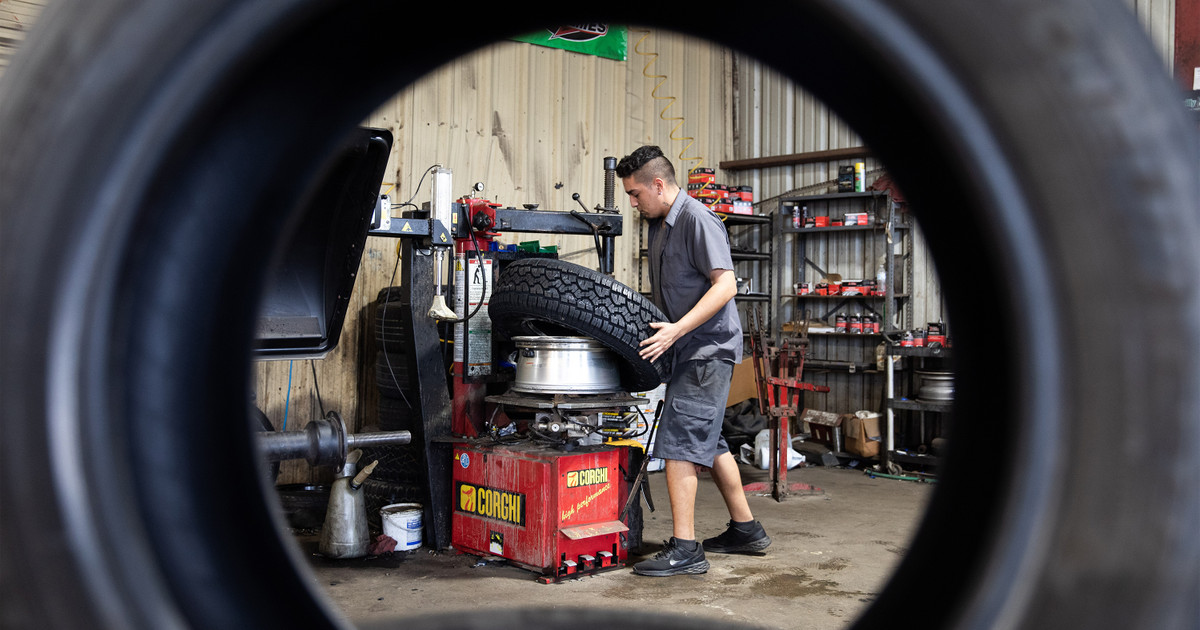The Environmental Advantages of Correct Tire Upkeep
Maintaining proper tire treatment is usually overlooked, yet its influence on the environment is extensive. From lowering gas consumption to lowering emissions result, the advantages are far-reaching. Proper tire upkeep not only prolongs the lifespan of tires yet additionally lowers garbage dump waste and adds to boosted air high quality. The interconnectedness of these benefits highlights the critical function that simple maintenance practices can play in promoting environmental sustainability.
Reduced Fuel Intake
Improving tire maintenance techniques can result in a substantial reduction in fuel intake for cars. morris tire service. Correctly filled with air tires ensure ideal contact with the road surface, reducing rolling resistance and boosting gas performance. According to the U.S. Division of Power, underinflated tires can decrease gas mileage by 0.2% for every 1 psi drop in pressure in all 4 tires. This may feel like a small percent, however when increased by the number of automobiles when driving, the cumulative effect is significant.
Along with tire pressure, regular tire rotations and alignments also play an important function in fuel efficiency. Unevenly worn tires can increase fuel intake as the engine functions harder to keep rate and grip. By maintaining proper placement and rotating tires at recommended periods, drivers can ensure also put on and prolong the life of their tires, ultimately saving gas and minimizing their carbon footprint.
Extended Tire Lifespan
Extending the life-span of tires is a crucial aspect of efficient lorry upkeep techniques that can generate expense savings and ecological advantages in the future. By properly keeping tires, motorists can dramatically extend their usability, reducing the regularity at which brand-new tires need to be manufactured and old ones dealt with. This not just conserves beneficial sources but additionally reduces the power and discharges connected with tire manufacturing and disposal processes.
Consistently examining tire pressure, revolving tires, and guaranteeing proper alignment are vital action in expanding tire life-span. Sufficient step depth is vital for ideal grip and safety, however it also plays a role in the length of time tires can be utilized before requiring replacement. In addition, staying clear of aggressive driving behaviors that speed up tire wear, such as rough stopping and sharp turns, can even more enhance tire durability.
Inevitably, increasing the durability of tires with aggressive maintenance not only benefits the environment by minimizing waste and preserving sources but likewise causes cost financial savings for vehicle owners by delaying the requirement for brand-new tire acquisitions.
Reduced Emissions Output
Effective tire maintenance methods contribute to a reduction in exhausts output, lining up with environmental sustainability goals in the vehicle sector. Properly inflated tires, on a regular basis revolved and aligned, can enhance fuel efficiency, thus lowering the overall carbon dioxide discharges from lorries. When tires are underinflated, the engine must function harder to thrust the car, causing raised gas usage and higher emissions. By maintaining optimum tire stress degrees, vehicle drivers can aid alleviate these adverse ecological influences.
Furthermore, well-kept tires also enhance grip and minimize rolling resistance, even more boosting fuel performance. This, subsequently, decreases the amount of exhaust gases launched into the atmosphere. In addition, guaranteeing tires are properly blown up and aligned can expand the life expectancy of the tires, decreasing the frequency of tire replacements and the dig this linked environmental prices of tire manufacturing Visit Website and disposal.

Lowered Land Fill Waste
Offered the favorable impact of appropriate tire maintenance on minimizing emissions result, another substantial environmental benefit is the possibility for decreased garbage dump waste. When tires are not maintained properly, they put on out much faster and need to be changed a lot more regularly. This brings about a higher volume of utilized tires being taken care of in landfills. By guaranteeing that tires are correctly pumped up, lined up, balanced, and rotated regularly, their life-span can be considerably extended. This implies that fewer tires finish up in landfills, reducing the amount of non-biodegradable waste in these already overflowing sites.

Improved Air Quality
Enhancing air high quality with proper tire upkeep techniques is a crucial facet of sustainable environmental stewardship. When tires are underinflated, they produce more moving resistance, leading to boosted fuel usage and greater emissions of unsafe pollutants such as carbon monoxide and nitrogen oxides. Effectively inflated tires not only boost fuel efficiency however additionally decrease the amount of toxins launched into the air.
Additionally, well-maintained tires with proper step depth and alignment add to more secure motoring conditions, reducing the probability of crashes that can cause the release of additional contaminants into the environment. By expanding the life-span of tires through regular maintenance and turning, fewer tires are discarded prematurely, decreasing the environmental effect of tire disposal and production procedures.
Verdict
In final thought, correct tire maintenance offers various environmental benefits. By decreasing gas usage, prolonging tire life expectancy, lowering discharges result, decreasing landfill waste, and improving air high quality, individuals can contribute to a much healthier earth. These initiatives not just benefit the atmosphere yet also help to conserve resources and reduce total ecological effect. It is essential for individuals to focus on tire maintenance as an easy yet effective means to shield the setting for future generations.
Appropriate tire maintenance not just prolongs the life expectancy of tires but additionally lowers garbage dump waste and contributes to boosted air high quality - morris try this site tire. By maintaining proper alignment and turning tires at recommended intervals, vehicle drivers can guarantee also wear and prolong the life of their tires, eventually saving gas and minimizing their carbon footprint
By effectively preserving tires, chauffeurs can considerably lengthen their usability, lowering the frequency at which brand-new tires need to be made and old ones disposed of.Consistently inspecting tire pressure, turning tires, and making certain appropriate alignment are necessary steps in prolonging tire lifespan. Furthermore, making certain tires are effectively pumped up and aligned can expand the lifespan of the tires, minimizing the frequency of tire substitutes and the connected ecological costs of tire production and disposal.
Comments on “Morris Tire Service: Where Accuracy and Efficiency Converge”